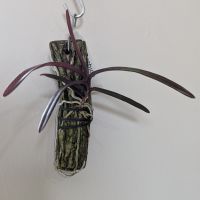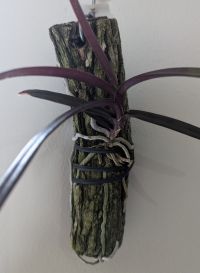No edit summary |
No edit summary |
||
| Line 1: | Line 1: | ||
[[File:Photo_2024-08-13_16.46.06.jpeg|200px|thumb|bottom|Ascocentrum christensonianum (2024-08-13)]] | |||
[[File:Photo_2024-08-13_16.46.09.jpeg|200px|thumb|bottom|Ascocentrum christensonianum (2024-08-13)]] | |||
<b>Received:</b> 2024-08-01 | <b>Received:</b> 2024-08-01 | ||
| Line 16: | Line 19: | ||
<b>Blooming:</b> Blooms in the spring and autumn on an erect, axillary, 10-15cm long, several-flowered inflorescence. Flowers are 1.4cm in diameter, with a slightly bucket shape are arranged along almost the entire length of the inflorescence. They are pale pink, pink or lavender-pink and have a pink lip, which has a purple spot in the middle | <b>Blooming:</b> Blooms in the spring and autumn on an erect, axillary, 10-15cm long, several-flowered inflorescence. Flowers are 1.4cm in diameter, with a slightly bucket shape are arranged along almost the entire length of the inflorescence. They are pale pink, pink or lavender-pink and have a pink lip, which has a purple spot in the middle | ||
Latest revision as of 10:06, 14 August 2024


Received: 2024-08-01
General: Miniature to medium-sized, hot to warm growing, monopodial epiphyte that has an erect stem enveloped completely by leaf bearing sheaths carrying strap shaped, acutely tridenticulate apically leaves. The leaves are 10-16cm long and 0.5-0.8cm wide. Their colour is fern-green when they grow in shade, but they get intense red when they grow in full sun
Light: 35000 - 45000 lux
Temperature: The average temperature of the summer day is 32℃, the night 23℃, and the daily difference is 9℃. The average temperature of the winter day is 27-28℃, the night 19-21℃, and the daily difference is 6-8℃
Humidity: For most of the year needs humidity of 75-80%, but for a period of about 1 month during the autumn rainy season it increases to 85%
Watering: Should be watered daily during active growth, but their roots must always dry between watering. Fogging between watering carried out in the early morning is beneficial, especially during hot and dry weather
Fertilisation: It is recommended to feed weekly 1/4-1/2 of the usual dose of fertiliser for Orchids. From spring to mid-summer, it is more useful to use a fertiliser with a high nitrogen content, and then to the end of autumn with a high content of phosphorus
Rest period: In winter, when not in active growth, the amount of water should be reduced, especially if grown in conditions of a dark short day. If the amount of water is limited, fertilisation should also be reduced. When new growths appear in the spring, regular watering and fertilisation should be resumed
Blooming: Blooms in the spring and autumn on an erect, axillary, 10-15cm long, several-flowered inflorescence. Flowers are 1.4cm in diameter, with a slightly bucket shape are arranged along almost the entire length of the inflorescence. They are pale pink, pink or lavender-pink and have a pink lip, which has a purple spot in the middle